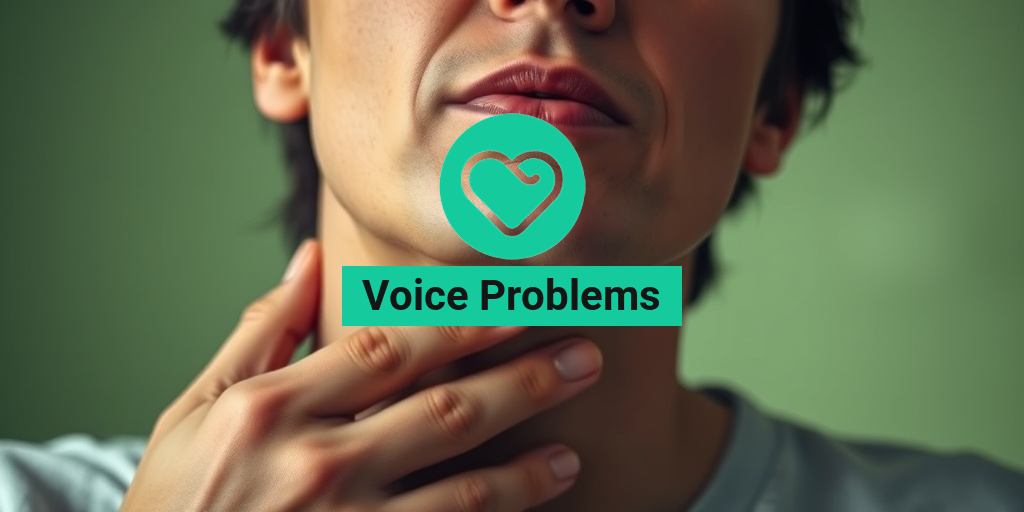What Are Voice Problems?
Voice problems, also known as voice disorders, refer to a range of conditions that affect the quality, pitch, volume, or flexibility of the voice. These issues can arise from various factors, including physical, neurological, or psychological causes. When someone experiences voice problems, they may find it difficult to speak clearly, project their voice, or maintain vocal endurance. This can significantly impact communication, social interactions, and overall quality of life.
Understanding voice problems is essential for identifying the right treatment and management strategies. Whether you’re dealing with a temporary issue or a chronic condition, recognizing the signs and symptoms can help you seek appropriate care. If you’re experiencing persistent voice problems, it’s advisable to consult a healthcare professional or a speech-language pathologist for a thorough evaluation.
Common Voice Problems
Voice problems can manifest in various ways, and their causes can differ widely. Here are some of the most common voice problems that individuals may encounter:
1. Hoarseness
Hoarseness is one of the most prevalent voice problems, characterized by a raspy or strained voice. It can result from overuse of the vocal cords, infections, allergies, or even acid reflux. If hoarseness persists for more than two weeks, it’s important to seek medical advice.
2. Vocal Nodules
Vocal nodules, often referred to as “singer’s nodules,” are small, callous-like growths on the vocal cords caused by vocal strain or misuse. They can lead to a breathy or rough voice. Treatment typically involves voice therapy and, in some cases, surgery.
3. Laryngitis
Laryngitis is the inflammation of the larynx (voice box), often due to viral infections, overuse, or irritants like smoke. Symptoms include a hoarse voice, throat pain, and difficulty speaking. Most cases resolve with rest and hydration.
4. Voice Problems After Surgery
Many individuals experience voice problems after surgical procedures, particularly those involving the throat or neck, such as thyroidectomy or anterior cervical discectomy and fusion (ACDF) surgery. These issues can arise from swelling, nerve damage, or changes in vocal cord function. Rehabilitation and voice therapy are often recommended to aid recovery.
5. Voice Problems in the Elderly
As people age, they may experience changes in their voice due to natural wear and tear on the vocal cords, decreased lung capacity, or medical conditions like Parkinson’s disease. Voice therapy can help older adults maintain vocal health and improve communication.
6. Voice Problems After Stroke
Stroke can lead to various speech and voice disorders, including dysphonia (difficulty producing voice) and aphasia (difficulty with language). Rehabilitation through speech therapy is crucial for recovery and regaining effective communication skills.
7. Voice Problems After COVID-19
Many individuals recovering from COVID-19 report persistent voice problems, including hoarseness and vocal fatigue. This can be attributed to respiratory issues or inflammation. Consulting a healthcare provider for tailored recovery strategies is essential.
8. Voice Problems from Acid Reflux
Acid reflux can irritate the vocal cords, leading to symptoms like hoarseness and throat clearing. Managing acid reflux through dietary changes and medication can significantly improve voice quality.
9. Voice Problems in Transgender Individuals
Transgender individuals may experience voice problems related to hormone therapy or the desire to modify their voice to align with their gender identity. Voice training and therapy can be beneficial in achieving desired vocal characteristics.
10. Voice Problems in Parkinson’s Disease
Parkinson’s disease can affect the muscles involved in voice production, leading to a softer, monotone voice. Speech therapy can help individuals with Parkinson’s improve their vocal strength and clarity.
In conclusion, voice problems can arise from a variety of causes and can significantly impact daily life. If you or someone you know is experiencing voice issues, it’s important to seek professional help. Resources like Yesil Health AI can provide evidence-based health answers and guidance on managing voice problems effectively. Remember, early intervention can lead to better outcomes and improved vocal health! 🎤✨

Voice Problem Symptoms
Voice problems can manifest in various ways, affecting not just how we communicate but also our overall quality of life. Recognizing the symptoms early can lead to timely intervention and treatment. Here are some common symptoms associated with voice problems:
1. Hoarseness
Hoarseness is one of the most prevalent symptoms of voice problems. It can make your voice sound raspy, strained, or breathy. This condition may arise from overuse of the voice, infections, or even allergies. If hoarseness persists for more than two weeks, it’s essential to consult a healthcare professional.
2. Loss of Voice (Aphonia)
Aphonia refers to a complete loss of voice. This can be temporary or chronic and may result from vocal cord damage, severe laryngitis, or neurological conditions. Individuals experiencing aphonia often find it challenging to speak at all, which can be distressing.
3. Vocal Fatigue
Vocal fatigue occurs when the voice becomes tired after speaking for extended periods. This can lead to discomfort and a feeling of strain in the throat. It’s often experienced by teachers, singers, and public speakers who rely heavily on their voices.
4. Changes in Pitch
Sudden changes in pitch, whether higher or lower, can indicate underlying voice problems. This symptom may be particularly concerning in elderly individuals or those recovering from surgeries affecting the throat or vocal cords.
5. Pain or Discomfort
Experiencing pain or discomfort while speaking or swallowing can signal serious voice problems. Conditions such as acid reflux can irritate the vocal cords, leading to pain. If you notice persistent discomfort, it’s crucial to seek medical advice.
6. Breathy Voice
A breathy voice occurs when there is an inadequate closure of the vocal cords, allowing air to escape during speech. This symptom can be indicative of various issues, including vocal cord nodules or paralysis.
7. Difficulty Projecting the Voice
Struggling to project your voice can be frustrating, especially in social or professional settings. This symptom may stem from vocal cord issues or even psychological factors such as anxiety.
Causes of Voice Problems
Understanding the causes of voice problems is essential for effective treatment. Various factors can contribute to voice issues, ranging from lifestyle choices to medical conditions. Here are some common causes:
1. Vocal Cord Overuse
One of the most common causes of voice problems is vocal cord overuse. This can occur in individuals who speak loudly for extended periods, such as teachers or performers. Over time, this strain can lead to hoarseness or vocal fatigue.
2. Infections
Viral infections, such as the common cold or flu, can lead to laryngitis, causing inflammation of the vocal cords. This inflammation can result in hoarseness or loss of voice. Bacterial infections may also contribute to voice problems, requiring medical treatment.
3. Gastroesophageal Reflux Disease (GERD)
Acid reflux can significantly impact the voice. When stomach acid flows back into the esophagus, it can irritate the vocal cords, leading to symptoms such as hoarseness and a chronic cough. Managing GERD through lifestyle changes and medication can help alleviate voice problems.
4. Neurological Conditions
Certain neurological conditions, such as Parkinson’s disease or stroke, can affect the muscles involved in voice production. Individuals with these conditions may experience changes in voice quality, pitch, and volume.
5. Structural Abnormalities
Structural issues, such as vocal cord nodules, polyps, or cysts, can lead to significant voice problems. These abnormalities may require surgical intervention or voice therapy for resolution.
6. Hormonal Changes
Hormonal fluctuations, particularly in transgender individuals undergoing hormone therapy, can lead to voice changes. It’s essential for those experiencing voice problems during this transition to seek guidance from a voice specialist.
7. Environmental Factors
Environmental irritants, such as smoke, dust, or allergens, can contribute to voice problems. Maintaining a healthy environment and avoiding exposure to these irritants can help protect your vocal health.
In conclusion, recognizing the symptoms and understanding the causes of voice problems is crucial for effective management. If you or someone you know is experiencing persistent voice issues, consulting a healthcare professional is the best course of action. Remember, your voice is a vital part of communication, and taking care of it is essential! 🎤✨

Risk Factors for Voice Issues
Voice problems can affect anyone, but certain factors can increase the likelihood of developing these issues. Understanding these risk factors is crucial for prevention and early intervention. Here are some of the most common risk factors associated with voice problems:
Age
As we age, our vocal cords undergo natural changes. The elasticity and strength of the vocal folds can diminish, leading to a higher incidence of voice problems in the elderly. Conditions such as presbyphonia (age-related voice changes) can make it difficult for older adults to project their voices or maintain vocal clarity.
Medical Conditions
Several medical conditions can contribute to voice problems, including:
- Acid Reflux: Gastroesophageal reflux disease (GERD) can cause stomach acid to irritate the vocal cords, leading to hoarseness and discomfort.
- Neurological Disorders: Conditions like Parkinson’s disease can affect the muscles involved in voice production, resulting in a softer or more monotone voice.
- Thyroid Issues: After a thyroidectomy, some individuals may experience voice problems due to changes in the surrounding structures.
Vocal Overuse
People who use their voices extensively, such as teachers, singers, and public speakers, are at a higher risk for voice problems. Overuse can lead to vocal strain, nodules, or polyps on the vocal cords. It’s essential for these individuals to practice good vocal hygiene and take breaks when necessary.
Environmental Factors
Exposure to irritants such as smoke, pollution, and dry air can negatively impact vocal health. Maintaining a healthy environment and staying hydrated can help mitigate these risks.
Gender and Hormonal Changes
Voice problems can also be influenced by gender and hormonal changes. For instance, transgender individuals may experience voice issues during their transition due to hormonal therapy. Additionally, women may face voice changes during pregnancy or menopause due to hormonal fluctuations.
Diagnosing Voice Problems
Diagnosing voice problems involves a comprehensive evaluation by a healthcare professional, typically an otolaryngologist or a speech-language pathologist. Here’s what you can expect during the diagnostic process:
Medical History Review
The first step in diagnosing voice problems is a thorough review of your medical history. Your doctor will ask about:
- Duration and nature of the voice problem
- Any recent surgeries, such as thyroidectomy or ACDF surgery
- Existing medical conditions, including acid reflux or neurological disorders
- Vocal habits and occupational voice use
Physical Examination
A physical examination of the throat and vocal cords is crucial. This may involve:
- Laryngoscopy: A small camera is inserted through the nose or mouth to visualize the vocal cords.
- Stroboscopy: A specialized light is used to observe the vocal cords in motion, helping to identify any abnormalities.
Voice Assessment
A speech-language pathologist may conduct a voice assessment to evaluate the quality, pitch, and volume of your voice. This assessment can help determine the impact of the voice problem on your daily life and communication.
Additional Tests
In some cases, additional tests may be necessary to rule out underlying conditions. These can include:
- Allergy Testing: To identify any allergens that may be affecting your voice.
- Imaging Studies: Such as CT scans or MRIs, to examine the structures of the throat and neck.
Early diagnosis and intervention are key to managing voice problems effectively. If you or someone you know is experiencing voice issues, seeking professional help is essential for restoring vocal health. Remember, your voice is an important part of your identity, and taking care of it should be a priority! 🎤✨

Voice Problem Treatments
Voice problems can affect anyone, regardless of age or profession. Whether you’re a singer, teacher, or simply someone who relies on their voice for daily communication, experiencing voice issues can be frustrating and concerning. Fortunately, there are various treatments available to help restore your voice and improve vocal health.
Understanding the Causes of Voice Problems
Before diving into treatments, it’s essential to understand what might be causing your voice problems. Common causes include:
- Vocal Strain: Overusing your voice can lead to strain and fatigue.
- Medical Conditions: Conditions such as acid reflux, thyroid issues, or neurological disorders like Parkinson’s disease can impact your voice.
- Infections: Viral or bacterial infections can cause laryngitis, leading to hoarseness or loss of voice.
- Post-Surgical Changes: Voice problems after surgery, such as thyroidectomy or ACDF surgery, can occur due to changes in the vocal cords.
Common Treatments for Voice Problems
Depending on the underlying cause, treatments for voice problems can vary. Here are some effective options:
1. Voice Therapy
Working with a speech-language pathologist can be incredibly beneficial. Voice therapy involves exercises and techniques designed to strengthen your vocal cords and improve your speaking habits. This is particularly useful for individuals with voice problems in the elderly or those recovering from surgery.
2. Medications
If your voice problems stem from an underlying medical condition, medications may be necessary. For instance, if acid reflux is causing irritation to your vocal cords, proton pump inhibitors or antacids may help alleviate symptoms.
3. Lifestyle Changes
Making simple lifestyle adjustments can significantly improve vocal health. Consider the following:
- Stay Hydrated: Drinking plenty of water helps keep your vocal cords lubricated.
- Avoid Irritants: Stay away from smoking and secondhand smoke, as well as other irritants like strong perfumes.
- Rest Your Voice: If you feel strain, give your voice a break to recover.
4. Surgical Options
In some cases, surgical intervention may be necessary, especially for structural issues affecting the vocal cords. Procedures can range from minimally invasive techniques to more extensive surgeries, depending on the severity of the problem.
Special Considerations
Some individuals may face unique challenges related to voice problems:
- Voice Problems in Transgender Individuals: Transitioning can affect vocal quality, and specialized voice therapy can assist in achieving a desired vocal pitch.
- Voice Problems After Stroke: Rehabilitation may involve targeted exercises to regain control over speech and vocalization.
Preventing Voice Problems
Prevention is always better than cure, especially when it comes to maintaining vocal health. Here are some effective strategies to help you avoid voice problems:
1. Practice Good Vocal Hygiene
Just like any other part of your body, your vocal cords require care. Here are some tips:
- Warm Up Your Voice: Before extensive speaking or singing, warm up your vocal cords with gentle exercises.
- Limit Caffeine and Alcohol: Both can dehydrate your body and vocal cords.
- Use a Humidifier: Keeping the air moist can help prevent dryness in your throat and vocal cords.
2. Be Mindful of Your Environment
Environmental factors can significantly impact your voice. Consider the following:
- Avoid Loud Noises: If you work in a loud environment, use amplification devices to avoid straining your voice.
- Manage Allergies: Allergies can lead to throat irritation; managing them can help maintain vocal health.
3. Regular Check-Ups
For those at higher risk of voice problems, such as teachers or singers, regular check-ups with an ENT specialist can help catch any issues early on. Early intervention is key to preventing more severe voice problems down the line.
By understanding the treatments available and taking proactive steps to prevent voice problems, you can maintain a healthy voice and enjoy effective communication in your daily life. Remember, your voice is a vital tool—take care of it! 🎤✨

Frequently Asked Questions about Voice Problems
What are common causes of voice problems?
Voice problems can arise from various factors, including:
- Vocal strain: Overuse or misuse of the voice can lead to hoarseness or loss of voice.
- Medical conditions: Conditions such as acid reflux, thyroid issues, or neurological disorders can affect voice quality.
- Infections: Viral or bacterial infections can cause inflammation of the vocal cords.
- Environmental factors: Dry air, allergens, and irritants can contribute to voice issues.
How can I improve my voice problems?
Improving voice problems often involves:
- Voice rest: Allowing your vocal cords to rest can help reduce strain.
- Hydration: Drinking plenty of water keeps the vocal cords lubricated.
- Speech therapy: Working with a speech therapist can provide techniques to improve voice quality.
- Avoiding irritants: Steering clear of smoke and other irritants can help maintain vocal health.
Are voice problems common after surgery?
Yes, voice problems after surgery can occur, especially if the surgery involved the neck or throat. It’s essential to follow post-operative care instructions and consult your doctor if you experience persistent issues.
What voice problems are common in the elderly?
As people age, they may experience:
- Changes in vocal quality: The voice may become weaker or more hoarse.
- Difficulty projecting: Seniors may find it harder to speak loudly or clearly.
- Increased vocal fatigue: Longer conversations may lead to tiredness in the voice.
Can voice problems occur after a stroke?
Yes, voice problems after a stroke are common due to potential damage to the areas of the brain responsible for speech and language. Rehabilitation and speech therapy can aid recovery.
Is there a link between voice problems and COVID-19?
Some individuals report experiencing voice problems after COVID-19, which may include hoarseness or changes in vocal quality. Ongoing research is being conducted to understand the long-term effects of the virus on vocal health.
How does acid reflux affect the voice?
Voice problems from acid reflux can occur when stomach acid irritates the vocal cords, leading to symptoms like hoarseness or a sore throat. Managing acid reflux through diet and medication can help alleviate these voice issues.
What voice issues do transgender individuals face?
Voice problems in transgender individuals can arise during the transition process, particularly for those undergoing hormone therapy. Voice training and therapy can assist in achieving desired vocal characteristics.
Can Parkinson’s disease affect the voice?
Yes, voice problems in Parkinson’s disease are common due to muscle control issues. Speech therapy can help improve clarity and volume.
What should I expect after a thyroidectomy?
Voice problems after thyroidectomy can occur due to potential nerve damage during surgery. It’s important to monitor any changes in voice and consult with a healthcare provider for guidance.
What is ACDF surgery, and how can it affect my voice?
Voice problems after ACDF surgery (anterior cervical discectomy and fusion) can happen if the surgery impacts the vocal cords or surrounding structures. Recovery may involve voice therapy to regain normal function.




